Nursing Report: Analyzing Peter's Case Study and Nursing Strategies
VerifiedAdded on 2022/11/17
|9
|1966
|264
Report
AI Summary
This report presents a nursing case study of a 45-year-old electrician named Peter, who presented at an after-hours medical clinic with complaints of insomnia and anxiety. The report addresses three key areas: the importance of empathy and therapeutic relationships in motivational interviewing, effective verbal and non-verbal communication skills for mental health nursing, and patient education regarding medication management, specifically Paroxetine. The analysis emphasizes the application of active listening, problem-solving communication, and therapeutic communication techniques to build trust and facilitate a comprehensive understanding of the patient's mental health concerns. It also highlights the importance of educating the patient about medication dosage, potential side effects, and the importance of adherence. The report concludes that effective communication and patient education are crucial for successful treatment outcomes and improved patient participation in their care plan. The report uses APA 6th edition referencing style.
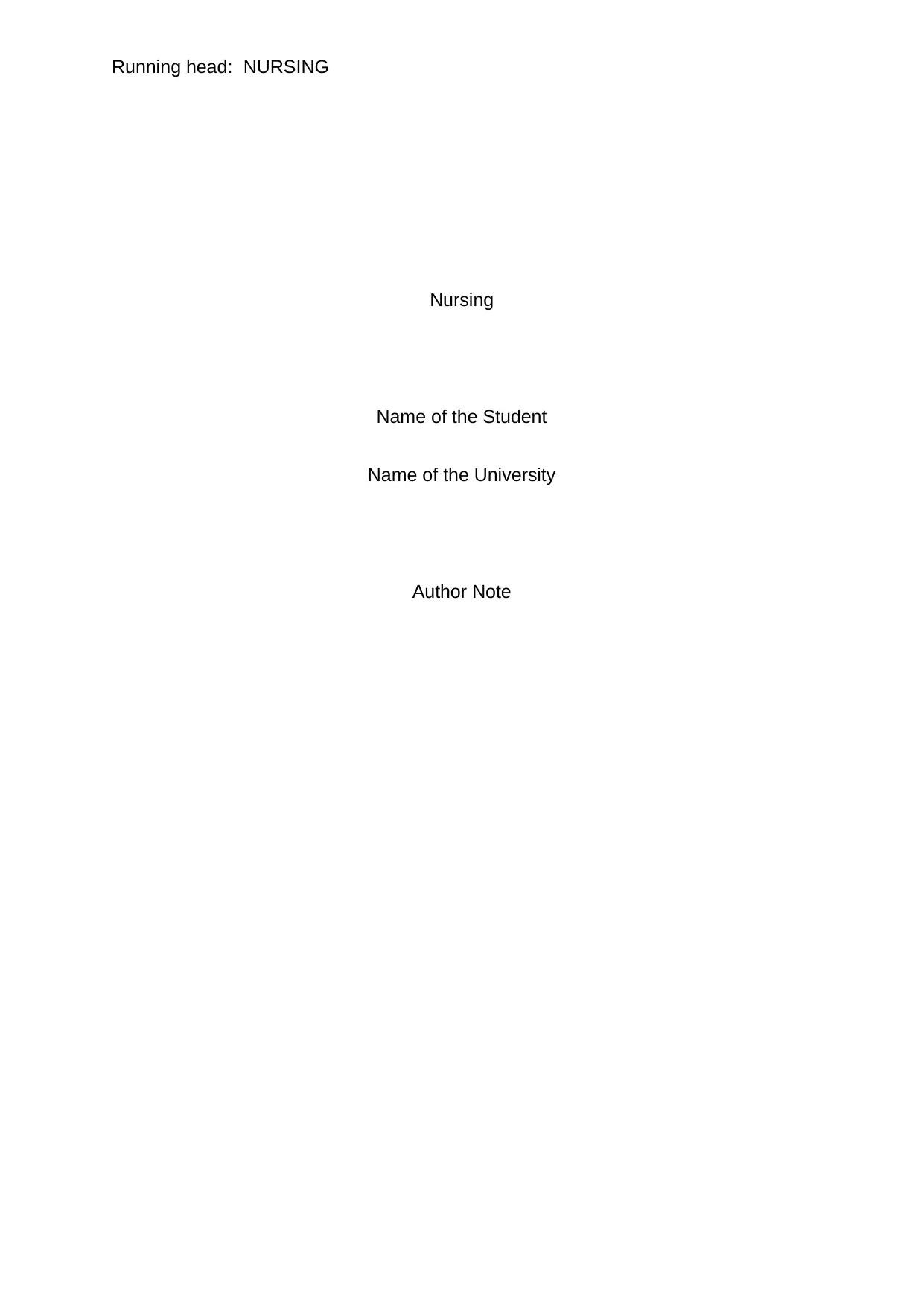
Running head: NURSING
Nursing
Name of the Student
Name of the University
Author Note
Nursing
Name of the Student
Name of the University
Author Note
Paraphrase This Document
Need a fresh take? Get an instant paraphrase of this document with our AI Paraphraser
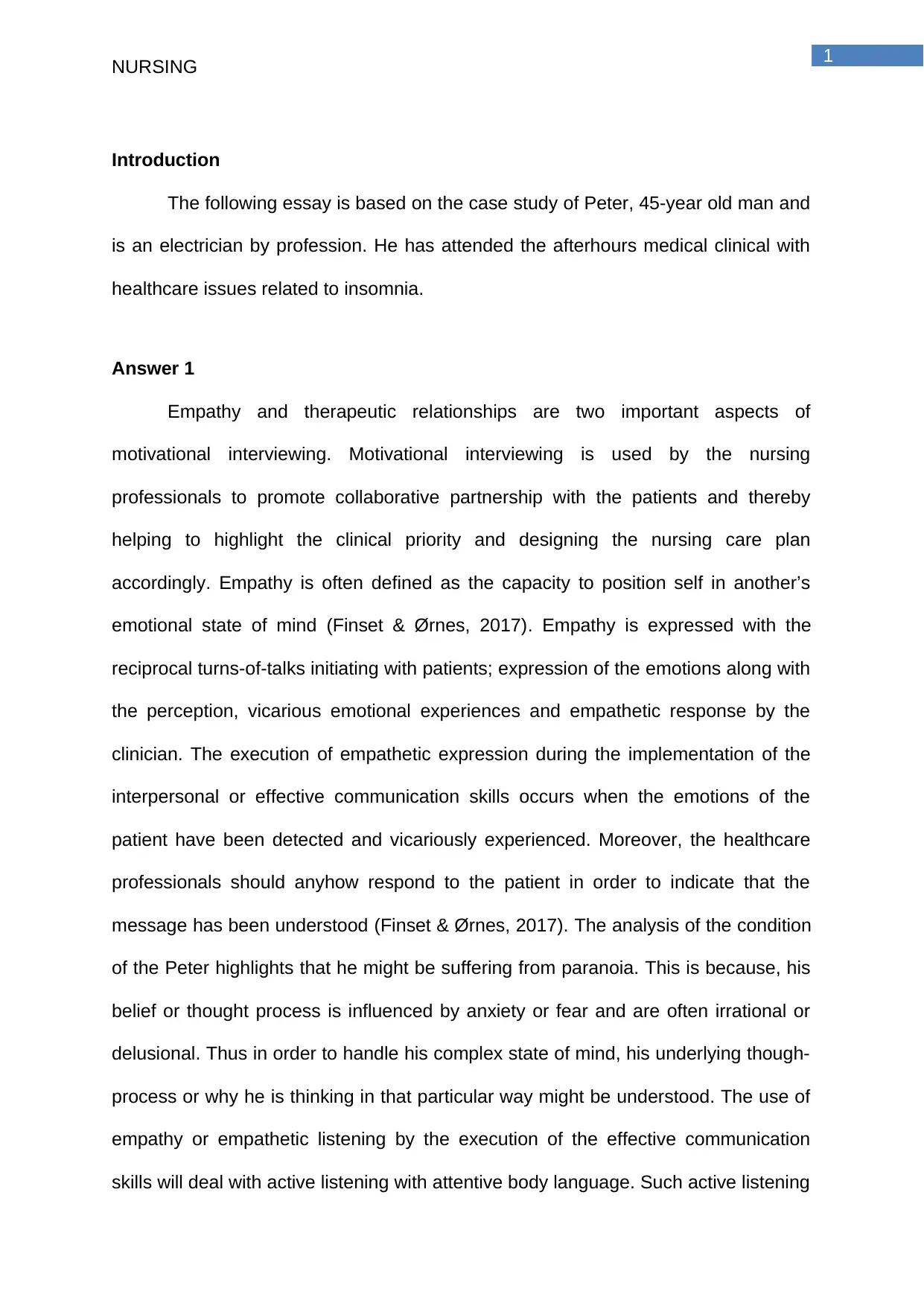
1
NURSING
Introduction
The following essay is based on the case study of Peter, 45-year old man and
is an electrician by profession. He has attended the afterhours medical clinical with
healthcare issues related to insomnia.
Answer 1
Empathy and therapeutic relationships are two important aspects of
motivational interviewing. Motivational interviewing is used by the nursing
professionals to promote collaborative partnership with the patients and thereby
helping to highlight the clinical priority and designing the nursing care plan
accordingly. Empathy is often defined as the capacity to position self in another’s
emotional state of mind (Finset & Ørnes, 2017). Empathy is expressed with the
reciprocal turns-of-talks initiating with patients; expression of the emotions along with
the perception, vicarious emotional experiences and empathetic response by the
clinician. The execution of empathetic expression during the implementation of the
interpersonal or effective communication skills occurs when the emotions of the
patient have been detected and vicariously experienced. Moreover, the healthcare
professionals should anyhow respond to the patient in order to indicate that the
message has been understood (Finset & Ørnes, 2017). The analysis of the condition
of the Peter highlights that he might be suffering from paranoia. This is because, his
belief or thought process is influenced by anxiety or fear and are often irrational or
delusional. Thus in order to handle his complex state of mind, his underlying though-
process or why he is thinking in that particular way might be understood. The use of
empathy or empathetic listening by the execution of the effective communication
skills will deal with active listening with attentive body language. Such active listening
NURSING
Introduction
The following essay is based on the case study of Peter, 45-year old man and
is an electrician by profession. He has attended the afterhours medical clinical with
healthcare issues related to insomnia.
Answer 1
Empathy and therapeutic relationships are two important aspects of
motivational interviewing. Motivational interviewing is used by the nursing
professionals to promote collaborative partnership with the patients and thereby
helping to highlight the clinical priority and designing the nursing care plan
accordingly. Empathy is often defined as the capacity to position self in another’s
emotional state of mind (Finset & Ørnes, 2017). Empathy is expressed with the
reciprocal turns-of-talks initiating with patients; expression of the emotions along with
the perception, vicarious emotional experiences and empathetic response by the
clinician. The execution of empathetic expression during the implementation of the
interpersonal or effective communication skills occurs when the emotions of the
patient have been detected and vicariously experienced. Moreover, the healthcare
professionals should anyhow respond to the patient in order to indicate that the
message has been understood (Finset & Ørnes, 2017). The analysis of the condition
of the Peter highlights that he might be suffering from paranoia. This is because, his
belief or thought process is influenced by anxiety or fear and are often irrational or
delusional. Thus in order to handle his complex state of mind, his underlying though-
process or why he is thinking in that particular way might be understood. The use of
empathy or empathetic listening by the execution of the effective communication
skills will deal with active listening with attentive body language. Such active listening
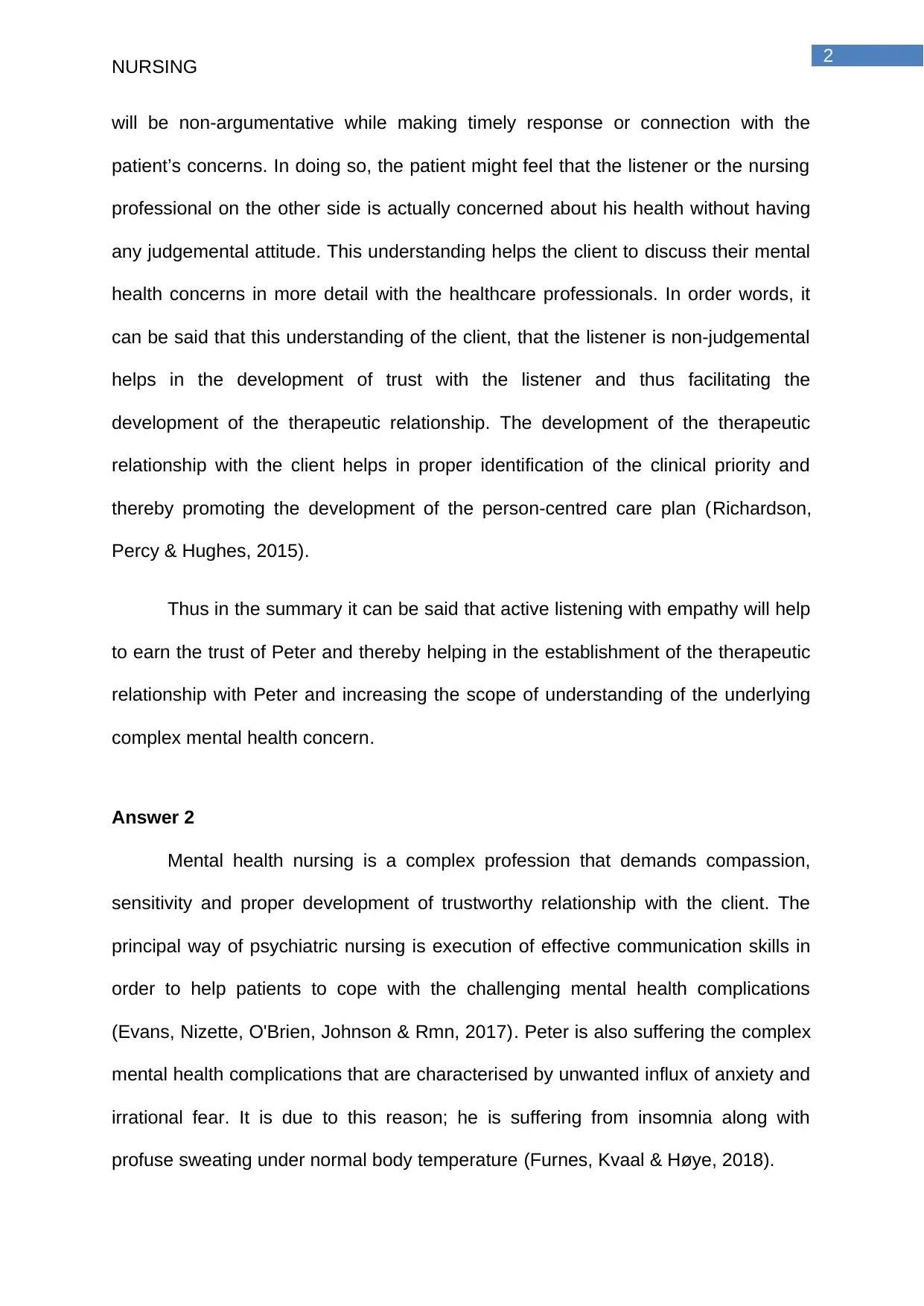
2
NURSING
will be non-argumentative while making timely response or connection with the
patient’s concerns. In doing so, the patient might feel that the listener or the nursing
professional on the other side is actually concerned about his health without having
any judgemental attitude. This understanding helps the client to discuss their mental
health concerns in more detail with the healthcare professionals. In order words, it
can be said that this understanding of the client, that the listener is non-judgemental
helps in the development of trust with the listener and thus facilitating the
development of the therapeutic relationship. The development of the therapeutic
relationship with the client helps in proper identification of the clinical priority and
thereby promoting the development of the person-centred care plan (Richardson,
Percy & Hughes, 2015).
Thus in the summary it can be said that active listening with empathy will help
to earn the trust of Peter and thereby helping in the establishment of the therapeutic
relationship with Peter and increasing the scope of understanding of the underlying
complex mental health concern.
Answer 2
Mental health nursing is a complex profession that demands compassion,
sensitivity and proper development of trustworthy relationship with the client. The
principal way of psychiatric nursing is execution of effective communication skills in
order to help patients to cope with the challenging mental health complications
(Evans, Nizette, O'Brien, Johnson & Rmn, 2017). Peter is also suffering the complex
mental health complications that are characterised by unwanted influx of anxiety and
irrational fear. It is due to this reason; he is suffering from insomnia along with
profuse sweating under normal body temperature (Furnes, Kvaal & Høye, 2018).
NURSING
will be non-argumentative while making timely response or connection with the
patient’s concerns. In doing so, the patient might feel that the listener or the nursing
professional on the other side is actually concerned about his health without having
any judgemental attitude. This understanding helps the client to discuss their mental
health concerns in more detail with the healthcare professionals. In order words, it
can be said that this understanding of the client, that the listener is non-judgemental
helps in the development of trust with the listener and thus facilitating the
development of the therapeutic relationship. The development of the therapeutic
relationship with the client helps in proper identification of the clinical priority and
thereby promoting the development of the person-centred care plan (Richardson,
Percy & Hughes, 2015).
Thus in the summary it can be said that active listening with empathy will help
to earn the trust of Peter and thereby helping in the establishment of the therapeutic
relationship with Peter and increasing the scope of understanding of the underlying
complex mental health concern.
Answer 2
Mental health nursing is a complex profession that demands compassion,
sensitivity and proper development of trustworthy relationship with the client. The
principal way of psychiatric nursing is execution of effective communication skills in
order to help patients to cope with the challenging mental health complications
(Evans, Nizette, O'Brien, Johnson & Rmn, 2017). Peter is also suffering the complex
mental health complications that are characterised by unwanted influx of anxiety and
irrational fear. It is due to this reason; he is suffering from insomnia along with
profuse sweating under normal body temperature (Furnes, Kvaal & Høye, 2018).
⊘ This is a preview!⊘
Do you want full access?
Subscribe today to unlock all pages.

Trusted by 1+ million students worldwide
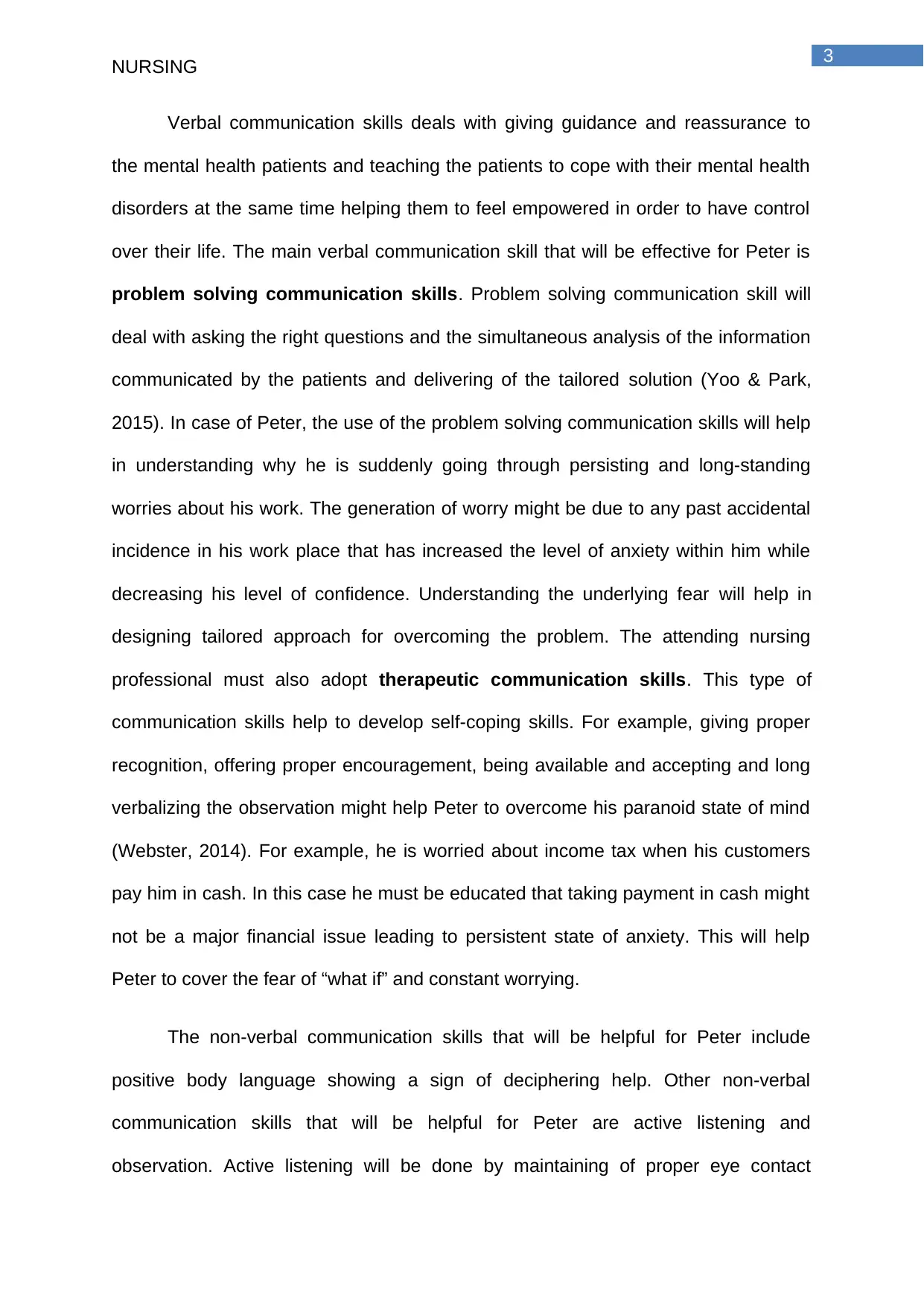
3
NURSING
Verbal communication skills deals with giving guidance and reassurance to
the mental health patients and teaching the patients to cope with their mental health
disorders at the same time helping them to feel empowered in order to have control
over their life. The main verbal communication skill that will be effective for Peter is
problem solving communication skills. Problem solving communication skill will
deal with asking the right questions and the simultaneous analysis of the information
communicated by the patients and delivering of the tailored solution (Yoo & Park,
2015). In case of Peter, the use of the problem solving communication skills will help
in understanding why he is suddenly going through persisting and long-standing
worries about his work. The generation of worry might be due to any past accidental
incidence in his work place that has increased the level of anxiety within him while
decreasing his level of confidence. Understanding the underlying fear will help in
designing tailored approach for overcoming the problem. The attending nursing
professional must also adopt therapeutic communication skills. This type of
communication skills help to develop self-coping skills. For example, giving proper
recognition, offering proper encouragement, being available and accepting and long
verbalizing the observation might help Peter to overcome his paranoid state of mind
(Webster, 2014). For example, he is worried about income tax when his customers
pay him in cash. In this case he must be educated that taking payment in cash might
not be a major financial issue leading to persistent state of anxiety. This will help
Peter to cover the fear of “what if” and constant worrying.
The non-verbal communication skills that will be helpful for Peter include
positive body language showing a sign of deciphering help. Other non-verbal
communication skills that will be helpful for Peter are active listening and
observation. Active listening will be done by maintaining of proper eye contact
NURSING
Verbal communication skills deals with giving guidance and reassurance to
the mental health patients and teaching the patients to cope with their mental health
disorders at the same time helping them to feel empowered in order to have control
over their life. The main verbal communication skill that will be effective for Peter is
problem solving communication skills. Problem solving communication skill will
deal with asking the right questions and the simultaneous analysis of the information
communicated by the patients and delivering of the tailored solution (Yoo & Park,
2015). In case of Peter, the use of the problem solving communication skills will help
in understanding why he is suddenly going through persisting and long-standing
worries about his work. The generation of worry might be due to any past accidental
incidence in his work place that has increased the level of anxiety within him while
decreasing his level of confidence. Understanding the underlying fear will help in
designing tailored approach for overcoming the problem. The attending nursing
professional must also adopt therapeutic communication skills. This type of
communication skills help to develop self-coping skills. For example, giving proper
recognition, offering proper encouragement, being available and accepting and long
verbalizing the observation might help Peter to overcome his paranoid state of mind
(Webster, 2014). For example, he is worried about income tax when his customers
pay him in cash. In this case he must be educated that taking payment in cash might
not be a major financial issue leading to persistent state of anxiety. This will help
Peter to cover the fear of “what if” and constant worrying.
The non-verbal communication skills that will be helpful for Peter include
positive body language showing a sign of deciphering help. Other non-verbal
communication skills that will be helpful for Peter are active listening and
observation. Active listening will be done by maintaining of proper eye contact
Paraphrase This Document
Need a fresh take? Get an instant paraphrase of this document with our AI Paraphraser
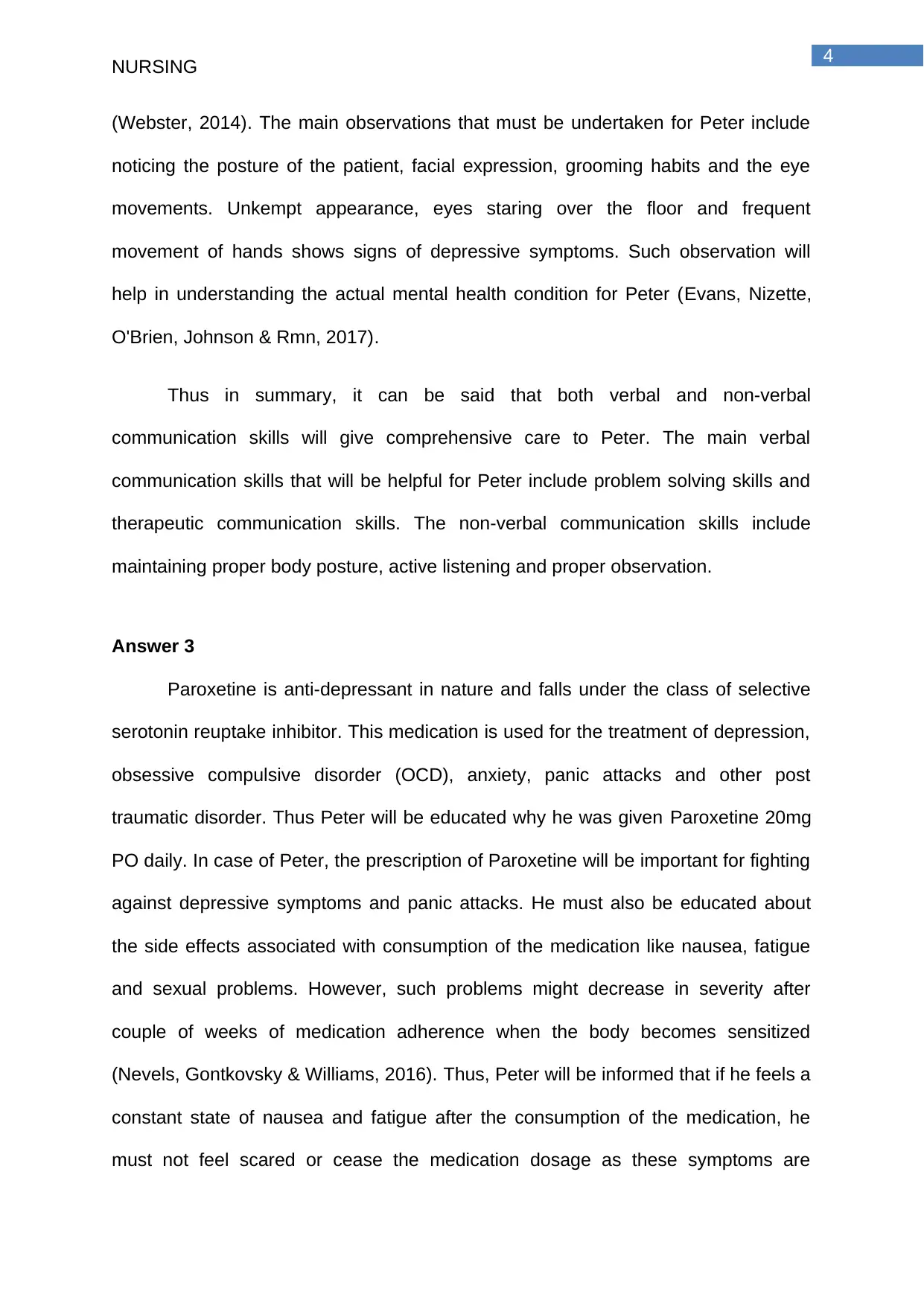
4
NURSING
(Webster, 2014). The main observations that must be undertaken for Peter include
noticing the posture of the patient, facial expression, grooming habits and the eye
movements. Unkempt appearance, eyes staring over the floor and frequent
movement of hands shows signs of depressive symptoms. Such observation will
help in understanding the actual mental health condition for Peter (Evans, Nizette,
O'Brien, Johnson & Rmn, 2017).
Thus in summary, it can be said that both verbal and non-verbal
communication skills will give comprehensive care to Peter. The main verbal
communication skills that will be helpful for Peter include problem solving skills and
therapeutic communication skills. The non-verbal communication skills include
maintaining proper body posture, active listening and proper observation.
Answer 3
Paroxetine is anti-depressant in nature and falls under the class of selective
serotonin reuptake inhibitor. This medication is used for the treatment of depression,
obsessive compulsive disorder (OCD), anxiety, panic attacks and other post
traumatic disorder. Thus Peter will be educated why he was given Paroxetine 20mg
PO daily. In case of Peter, the prescription of Paroxetine will be important for fighting
against depressive symptoms and panic attacks. He must also be educated about
the side effects associated with consumption of the medication like nausea, fatigue
and sexual problems. However, such problems might decrease in severity after
couple of weeks of medication adherence when the body becomes sensitized
(Nevels, Gontkovsky & Williams, 2016). Thus, Peter will be informed that if he feels a
constant state of nausea and fatigue after the consumption of the medication, he
must not feel scared or cease the medication dosage as these symptoms are
NURSING
(Webster, 2014). The main observations that must be undertaken for Peter include
noticing the posture of the patient, facial expression, grooming habits and the eye
movements. Unkempt appearance, eyes staring over the floor and frequent
movement of hands shows signs of depressive symptoms. Such observation will
help in understanding the actual mental health condition for Peter (Evans, Nizette,
O'Brien, Johnson & Rmn, 2017).
Thus in summary, it can be said that both verbal and non-verbal
communication skills will give comprehensive care to Peter. The main verbal
communication skills that will be helpful for Peter include problem solving skills and
therapeutic communication skills. The non-verbal communication skills include
maintaining proper body posture, active listening and proper observation.
Answer 3
Paroxetine is anti-depressant in nature and falls under the class of selective
serotonin reuptake inhibitor. This medication is used for the treatment of depression,
obsessive compulsive disorder (OCD), anxiety, panic attacks and other post
traumatic disorder. Thus Peter will be educated why he was given Paroxetine 20mg
PO daily. In case of Peter, the prescription of Paroxetine will be important for fighting
against depressive symptoms and panic attacks. He must also be educated about
the side effects associated with consumption of the medication like nausea, fatigue
and sexual problems. However, such problems might decrease in severity after
couple of weeks of medication adherence when the body becomes sensitized
(Nevels, Gontkovsky & Williams, 2016). Thus, Peter will be informed that if he feels a
constant state of nausea and fatigue after the consumption of the medication, he
must not feel scared or cease the medication dosage as these symptoms are
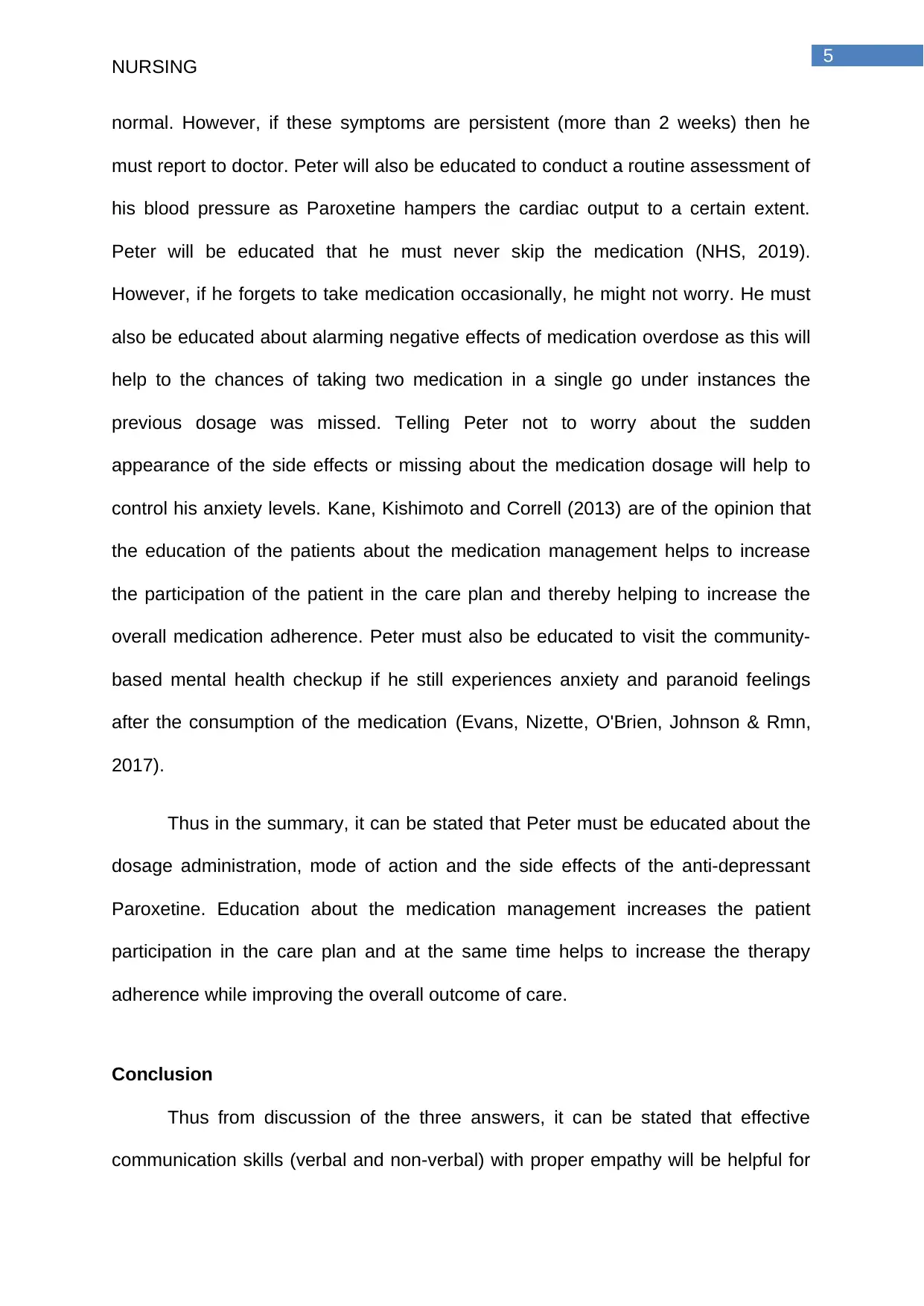
5
NURSING
normal. However, if these symptoms are persistent (more than 2 weeks) then he
must report to doctor. Peter will also be educated to conduct a routine assessment of
his blood pressure as Paroxetine hampers the cardiac output to a certain extent.
Peter will be educated that he must never skip the medication (NHS, 2019).
However, if he forgets to take medication occasionally, he might not worry. He must
also be educated about alarming negative effects of medication overdose as this will
help to the chances of taking two medication in a single go under instances the
previous dosage was missed. Telling Peter not to worry about the sudden
appearance of the side effects or missing about the medication dosage will help to
control his anxiety levels. Kane, Kishimoto and Correll (2013) are of the opinion that
the education of the patients about the medication management helps to increase
the participation of the patient in the care plan and thereby helping to increase the
overall medication adherence. Peter must also be educated to visit the community-
based mental health checkup if he still experiences anxiety and paranoid feelings
after the consumption of the medication (Evans, Nizette, O'Brien, Johnson & Rmn,
2017).
Thus in the summary, it can be stated that Peter must be educated about the
dosage administration, mode of action and the side effects of the anti-depressant
Paroxetine. Education about the medication management increases the patient
participation in the care plan and at the same time helps to increase the therapy
adherence while improving the overall outcome of care.
Conclusion
Thus from discussion of the three answers, it can be stated that effective
communication skills (verbal and non-verbal) with proper empathy will be helpful for
NURSING
normal. However, if these symptoms are persistent (more than 2 weeks) then he
must report to doctor. Peter will also be educated to conduct a routine assessment of
his blood pressure as Paroxetine hampers the cardiac output to a certain extent.
Peter will be educated that he must never skip the medication (NHS, 2019).
However, if he forgets to take medication occasionally, he might not worry. He must
also be educated about alarming negative effects of medication overdose as this will
help to the chances of taking two medication in a single go under instances the
previous dosage was missed. Telling Peter not to worry about the sudden
appearance of the side effects or missing about the medication dosage will help to
control his anxiety levels. Kane, Kishimoto and Correll (2013) are of the opinion that
the education of the patients about the medication management helps to increase
the participation of the patient in the care plan and thereby helping to increase the
overall medication adherence. Peter must also be educated to visit the community-
based mental health checkup if he still experiences anxiety and paranoid feelings
after the consumption of the medication (Evans, Nizette, O'Brien, Johnson & Rmn,
2017).
Thus in the summary, it can be stated that Peter must be educated about the
dosage administration, mode of action and the side effects of the anti-depressant
Paroxetine. Education about the medication management increases the patient
participation in the care plan and at the same time helps to increase the therapy
adherence while improving the overall outcome of care.
Conclusion
Thus from discussion of the three answers, it can be stated that effective
communication skills (verbal and non-verbal) with proper empathy will be helpful for
⊘ This is a preview!⊘
Do you want full access?
Subscribe today to unlock all pages.

Trusted by 1+ million students worldwide

6
NURSING
Peter. Peter must educated about the medication management in order to increase
therapy adherence.
NURSING
Peter. Peter must educated about the medication management in order to increase
therapy adherence.
Paraphrase This Document
Need a fresh take? Get an instant paraphrase of this document with our AI Paraphraser
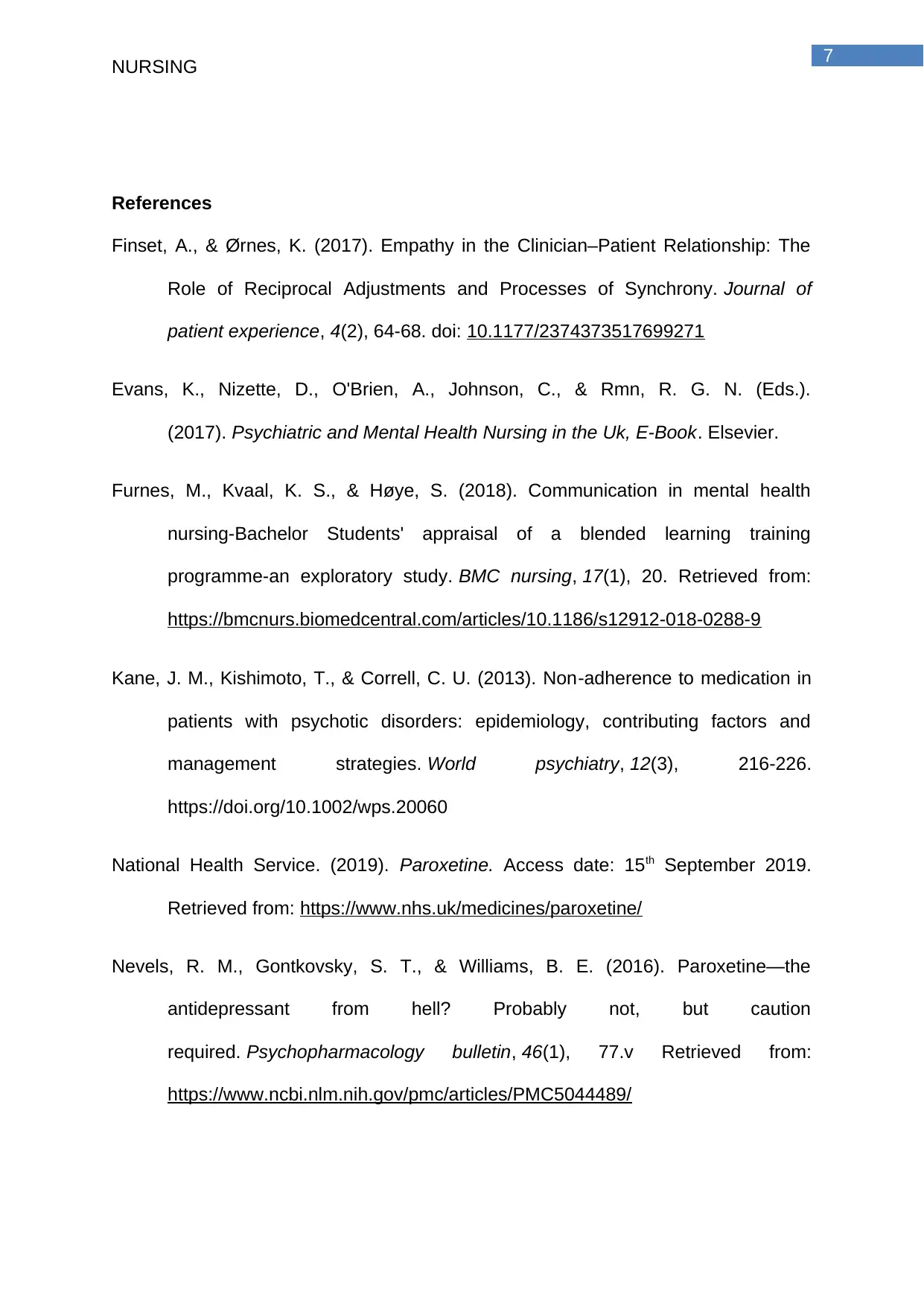
7
NURSING
References
Finset, A., & Ørnes, K. (2017). Empathy in the Clinician–Patient Relationship: The
Role of Reciprocal Adjustments and Processes of Synchrony. Journal of
patient experience, 4(2), 64-68. doi: 10.1177/2374373517699271
Evans, K., Nizette, D., O'Brien, A., Johnson, C., & Rmn, R. G. N. (Eds.).
(2017). Psychiatric and Mental Health Nursing in the Uk, E-Book. Elsevier.
Furnes, M., Kvaal, K. S., & Høye, S. (2018). Communication in mental health
nursing-Bachelor Students' appraisal of a blended learning training
programme-an exploratory study. BMC nursing, 17(1), 20. Retrieved from:
https://bmcnurs.biomedcentral.com/articles/10.1186/s12912-018-0288-9
Kane, J. M., Kishimoto, T., & Correll, C. U. (2013). Non‐adherence to medication in
patients with psychotic disorders: epidemiology, contributing factors and
management strategies. World psychiatry, 12(3), 216-226.
https://doi.org/10.1002/wps.20060
National Health Service. (2019). Paroxetine. Access date: 15th September 2019.
Retrieved from: https://www.nhs.uk/medicines/paroxetine/
Nevels, R. M., Gontkovsky, S. T., & Williams, B. E. (2016). Paroxetine—the
antidepressant from hell? Probably not, but caution
required. Psychopharmacology bulletin, 46(1), 77.v Retrieved from:
https://www.ncbi.nlm.nih.gov/pmc/articles/PMC5044489/
NURSING
References
Finset, A., & Ørnes, K. (2017). Empathy in the Clinician–Patient Relationship: The
Role of Reciprocal Adjustments and Processes of Synchrony. Journal of
patient experience, 4(2), 64-68. doi: 10.1177/2374373517699271
Evans, K., Nizette, D., O'Brien, A., Johnson, C., & Rmn, R. G. N. (Eds.).
(2017). Psychiatric and Mental Health Nursing in the Uk, E-Book. Elsevier.
Furnes, M., Kvaal, K. S., & Høye, S. (2018). Communication in mental health
nursing-Bachelor Students' appraisal of a blended learning training
programme-an exploratory study. BMC nursing, 17(1), 20. Retrieved from:
https://bmcnurs.biomedcentral.com/articles/10.1186/s12912-018-0288-9
Kane, J. M., Kishimoto, T., & Correll, C. U. (2013). Non‐adherence to medication in
patients with psychotic disorders: epidemiology, contributing factors and
management strategies. World psychiatry, 12(3), 216-226.
https://doi.org/10.1002/wps.20060
National Health Service. (2019). Paroxetine. Access date: 15th September 2019.
Retrieved from: https://www.nhs.uk/medicines/paroxetine/
Nevels, R. M., Gontkovsky, S. T., & Williams, B. E. (2016). Paroxetine—the
antidepressant from hell? Probably not, but caution
required. Psychopharmacology bulletin, 46(1), 77.v Retrieved from:
https://www.ncbi.nlm.nih.gov/pmc/articles/PMC5044489/
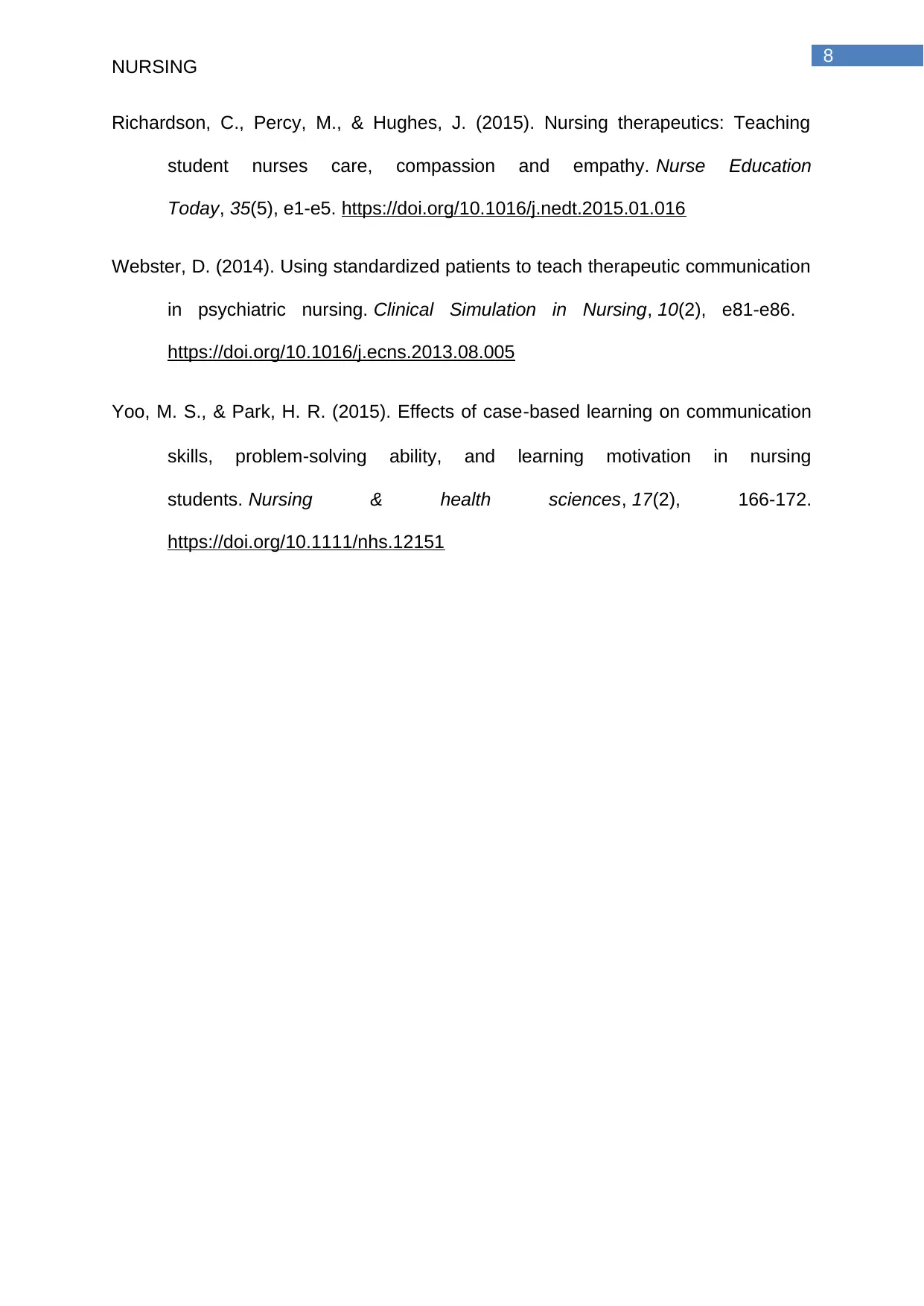
8
NURSING
Richardson, C., Percy, M., & Hughes, J. (2015). Nursing therapeutics: Teaching
student nurses care, compassion and empathy. Nurse Education
Today, 35(5), e1-e5. https://doi.org/10.1016/j.nedt.2015.01.016
Webster, D. (2014). Using standardized patients to teach therapeutic communication
in psychiatric nursing. Clinical Simulation in Nursing, 10(2), e81-e86.
https://doi.org/10.1016/j.ecns.2013.08.005
Yoo, M. S., & Park, H. R. (2015). Effects of case‐based learning on communication
skills, problem‐solving ability, and learning motivation in nursing
students. Nursing & health sciences, 17(2), 166-172.
https://doi.org/10.1111/nhs.12151
NURSING
Richardson, C., Percy, M., & Hughes, J. (2015). Nursing therapeutics: Teaching
student nurses care, compassion and empathy. Nurse Education
Today, 35(5), e1-e5. https://doi.org/10.1016/j.nedt.2015.01.016
Webster, D. (2014). Using standardized patients to teach therapeutic communication
in psychiatric nursing. Clinical Simulation in Nursing, 10(2), e81-e86.
https://doi.org/10.1016/j.ecns.2013.08.005
Yoo, M. S., & Park, H. R. (2015). Effects of case‐based learning on communication
skills, problem‐solving ability, and learning motivation in nursing
students. Nursing & health sciences, 17(2), 166-172.
https://doi.org/10.1111/nhs.12151
⊘ This is a preview!⊘
Do you want full access?
Subscribe today to unlock all pages.

Trusted by 1+ million students worldwide
1 out of 9
Related Documents
Your All-in-One AI-Powered Toolkit for Academic Success.
+13062052269
info@desklib.com
Available 24*7 on WhatsApp / Email
![[object Object]](/_next/static/media/star-bottom.7253800d.svg)
Unlock your academic potential
Copyright © 2020–2025 A2Z Services. All Rights Reserved. Developed and managed by ZUCOL.





